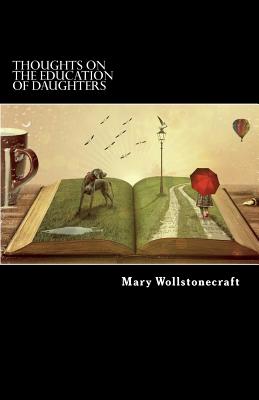Thoughts on the Education of Daughters

Thoughts on the Education of Daughters
Mary Wollstonecraft (27 April 1759 - 10 September 1797) was an English writer, philosopher, and advocate of women's rights. During her brief career, she wrote novels, treatises, a travel narrative, a history of the French Revolution, a conduct book, and a children's book. Wollstonecraft is best known for A Vindication of the Rights of Woman (1792), in which she argues that women are not naturally inferior to men, but appear to be only because they lack education. She suggests that both men and women should be treated as rational beings and imagines a social order founded on reason. Until the late 20th century, Wollstonecraft's life, which encompassed several unconventional personal relationships, received more attention than her writing. After two ill-fated affairs, with Henry Fuseli and Gilbert Imlay (by whom she had a daughter, Fanny Imlay), Wollstonecraft married the philosopher William Godwin, one of the forefathers of the anarchist movement. Wollstonecraft died at the age of 38, eleven days after giving birth to her second daughter, leaving behind several unfinished manuscripts. This daughter, Mary Wollstonecraft Godwin, became an accomplished writer herself, as Mary Shelley, the author of Frankenstein. After Wollstonecraft's death, her widower published a Memoir (1798) of her life, revealing her unorthodox lifestyle, which inadvertently destroyed her reputation for almost a century. However, with the emergence of the feminist movement at the turn of the twentieth century, Wollstonecraft's advocacy of women's equality and critiques of conventional femininity became increasingly important. Today Wollstonecraft is regarded as one of the founding feminist philosophers, and feminists often cite both her life and work as important influences. Wollstonecraft has what scholar Cora Kaplan labelled in 2002 a "curious" legacy that has evolved over time: "for an author-activist adept in many genres ... up until the last quarter-century Wollstonecraft's life has been read much more closely than her writing". After the devastating effect of Godwin's Memoirs, Wollstonecraft's reputation lay in tatters for a century; she was pilloried by such writers as Maria Edgeworth, who patterned the "freakish" Harriet Freke in Belinda (1801) after her. Other novelists such as Mary Hays, Charlotte Turner Smith, Fanny Burney, and Jane West created similar figures, all to teach a "moral lesson" to their readers. (Hays had been a close friend, and helped nurse her in her dying
PRP: 79.36 Lei
Acesta este Pretul Recomandat de Producator. Pretul de vanzare al produsului este afisat mai jos.
71.42Lei
71.42Lei
79.36 LeiIndisponibil
Descrierea produsului
Mary Wollstonecraft (27 April 1759 - 10 September 1797) was an English writer, philosopher, and advocate of women's rights. During her brief career, she wrote novels, treatises, a travel narrative, a history of the French Revolution, a conduct book, and a children's book. Wollstonecraft is best known for A Vindication of the Rights of Woman (1792), in which she argues that women are not naturally inferior to men, but appear to be only because they lack education. She suggests that both men and women should be treated as rational beings and imagines a social order founded on reason. Until the late 20th century, Wollstonecraft's life, which encompassed several unconventional personal relationships, received more attention than her writing. After two ill-fated affairs, with Henry Fuseli and Gilbert Imlay (by whom she had a daughter, Fanny Imlay), Wollstonecraft married the philosopher William Godwin, one of the forefathers of the anarchist movement. Wollstonecraft died at the age of 38, eleven days after giving birth to her second daughter, leaving behind several unfinished manuscripts. This daughter, Mary Wollstonecraft Godwin, became an accomplished writer herself, as Mary Shelley, the author of Frankenstein. After Wollstonecraft's death, her widower published a Memoir (1798) of her life, revealing her unorthodox lifestyle, which inadvertently destroyed her reputation for almost a century. However, with the emergence of the feminist movement at the turn of the twentieth century, Wollstonecraft's advocacy of women's equality and critiques of conventional femininity became increasingly important. Today Wollstonecraft is regarded as one of the founding feminist philosophers, and feminists often cite both her life and work as important influences. Wollstonecraft has what scholar Cora Kaplan labelled in 2002 a "curious" legacy that has evolved over time: "for an author-activist adept in many genres ... up until the last quarter-century Wollstonecraft's life has been read much more closely than her writing". After the devastating effect of Godwin's Memoirs, Wollstonecraft's reputation lay in tatters for a century; she was pilloried by such writers as Maria Edgeworth, who patterned the "freakish" Harriet Freke in Belinda (1801) after her. Other novelists such as Mary Hays, Charlotte Turner Smith, Fanny Burney, and Jane West created similar figures, all to teach a "moral lesson" to their readers. (Hays had been a close friend, and helped nurse her in her dying
Detaliile produsului











